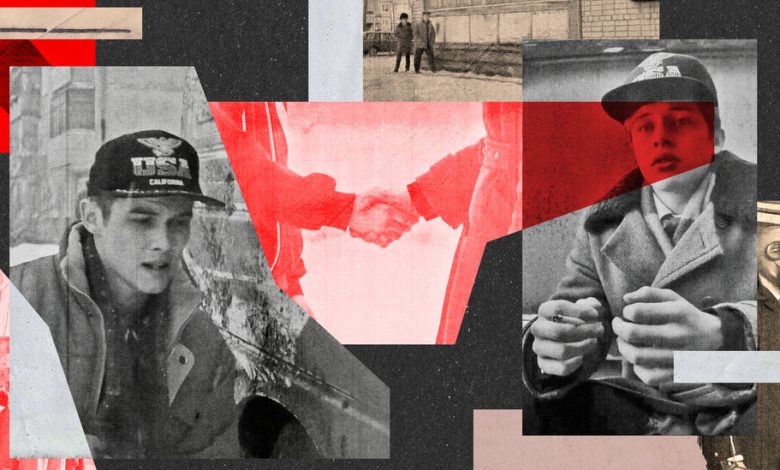The Bleak, Nihilistic Show Russians Can’t Stop Watching

In December, the Ukrainian culture ministry issued a warning about a Russian TV series that was being widely (and illegally) viewed across the besieged nation. There was no explicit mention of the offending show, which was described as “hostile propaganda,” but none was needed: Everyone knew it was “Slovo Patsana: Krov na Asphalte,” a new series about the youth gangs, or gruppirovki, that came to dominate the central Russian city Kazan in the final years of the Soviet Union.
The show’s title is usually translated to “The Boy’s Word,” though patsan has an edgier connotation. When we first meet the protagonist, Andrey Vasilyev, he is a sensitive teenager who plays the piano; then he is recruited into the Universam gang by a young man named Marat. Patsan was what such gangsters called one another, as if they were a unique breed of citizen. The opposite of the patsan was a chushpan: a loser, a rube, a working stiff. A patsan might die in a brawl or go to prison, but that was still better than sitting through workers’ committee meetings at the Tupolev helicopter factory. “We’re the street,” Marat says, after a brawl in a discothèque. (I’m translating loosely.) “In this city of weaklings, we are the only human beings.”
After its release last fall, the show bested “Squid Game” as Russia’s most streamed; in its first month, it saw more queries on the Russian search engine Yandex than “SVO,” the acronym for the “special military operation” in Ukraine. Its first half is concerned with a hat Andrey’s mother loses in a game of three-card monte; the second is about the contested ownership of a VCR, which spins into a bloody gang rivalry. “It’s the story of young men living in a society where there is no longer a unifying principle,” David MacFadyen, a professor of musicology and comparative literature and expert in Russian popular culture at the University of California Los Angeles, told me. “All that’s left is physical violence.”
At one point, Andrey’s affection for an older official — played by Anastasiya Krasovskaya, a Belarusian model who doesn’t exactly square with my recollections of Soviet martinets — brings him to a small party of would-be rockers whose Dylanesque sensibility he doesn’t share. Andrey stuns the hipsters by playing a few soulful chords on a piano. Then he abruptly slams the fallboard down, growling, “I see you around the neighborhood, I bury you.” In just three episodes, he has gone from Little Mozart to Ivan Drago. So would Russia go, in three decades, from the young democracy tempting Harvard Business School quants to a rogue superpower embracing North Korea.
Andrey is a blank. With his pouting lips and deep-set eyes, he resembles a tattoo-free Justin Bieber, but he is so defiantly affectless that even the care he lavishes on his mother and sister fails to make him sympathetic. After Marat’s girlfriend is raped and then dies by suicide, a rift emerges between the boys. “There are higher laws than the code of the patsan,” Marat says. Andrey looks at him indifferently — he hates weakness, because he was once weak himself. “There is no such law,” he says.
Russian television is still far behind where American television was when Tony Soprano first sat in Dr. Melfi’s waiting room, but “The Boy’s Word” is an attempt at something similar. The problem is its lack of irony. On “The Sopranos,” Tony the patient distanced himself from Tony the criminal, while the show kept a certain observational distance from its subject, elevating the series above ordinary television. As many great Soviet artists knew, irony can be remarkably subversive. But subversion is forbidden in Russia today, so “The Boy’s Word” only offers one face-punching after another against a backdrop of Soviet kitsch.